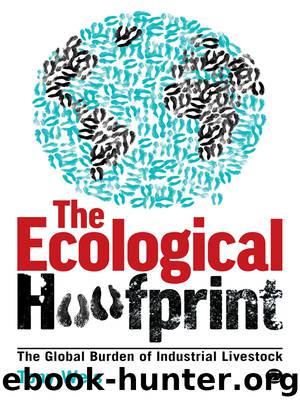The Ecological Hoofprint by Weis Tony

Author:Weis, Tony
Language: eng
Format: epub
Publisher: Zed Books
Published: 2013-03-11T16:00:00+00:00
Overriding soil mining The modern understanding of soil chemistry and fertilization is indelibly associated with the advances made by Justis von Liebig in the nineteenth century. One of Liebig’s most crucial discoveries was the ‘Law of the Minimum,’ which deciphered how plants need a certain mix of nutrients and how their growth is constrained by whatever nutrient is least abundant in relation to its requirements, with nitrogen, phosphorus, and potassium the most culpable controls on plant growth, and in farming landscapes more broadly. Nitrogen was a particular concern since most crops deplete nitrogen in soils. This is because plants are incapable of extracting nitrogen from the atmosphere, and instead must rely on certain bacteria – which exist only on certain plants – to fix and convert nitrogen into usable forms that can then cycle in soil organic material.
Through history, farming cultures tended to appreciate the importance of intercropping and using rotations with leguminous plants that have nitrogen-fixing bacteria in order to enrich soil fertility. But as these practices were broken and monocultures with nitrogen-depleting crops proliferated, the danger soon became clear. Having established how particular nutrient deficiencies constrain productivity, Liebig then showed how injections of these nutrients could, where they were scarce, drive great yield gains, a discovery that effectively ‘opened the door to seeing the soil as a chemical warehouse through which to supply crop growth.’20 Although declining soil fertility stems from the loss of biological complexity, organic content, and a range of nutrients, the expansion of industrial fertilizers was overwhelmingly focused on the ‘big three’ nutrients that are the greatest constraints to plant growth.
Around the period of Liebig’s great breakthrough, a new, unlikely resource emerged on the world stage: guano, bird droppings aged into a nitrogen- and phosphorus-rich fertilizer. The large-scale export of guano began from Peru and later Chile to Europe, followed by the USA setting out to annex small islands around the world containing this relatively rare resource, in a scramble that has been dubbed ‘guano and nitrate imperialism.’21 While most guano reserves were used up very quickly, they gave clear evidence of how concentrated doses of key nutrients could keep organically depleted soils productive, ultimately helping to set the course for industrial fertilizer development – and with it, the decline of historic soil conservation practices, leguminous rotations, and integrated livestock populations.
The game-changing advance in overriding declining soil fertility occurred in the early twentieth century, when Fritz Haber invented a process for manufacturing synthetic nitrogen fertilizer and Carl Bosch commercialized it. In the Haber-Bosch process, nitrogen and hydrogen from the air are combined under high temperatures and pressure, which involves a tremendous demand for energy. Commercial manufacturing took off in the immediate wake of the Second World War, partly owing to the easy conversion of plants that had been geared to making nitrogen bombs, and this boom crucially underpinned the great yield gains of the twentieth century, placing it among the most influential technologies ever established.22 The Haber-Bosch process continues to account for the greatest volume of industrial fertilizer on a world scale, predominantly using natural gas.
Download
This site does not store any files on its server. We only index and link to content provided by other sites. Please contact the content providers to delete copyright contents if any and email us, we'll remove relevant links or contents immediately.
The Secret History by Donna Tartt(19092)
The Social Justice Warrior Handbook by Lisa De Pasquale(12190)
Thirteen Reasons Why by Jay Asher(8912)
This Is How You Lose Her by Junot Diaz(6888)
Weapons of Math Destruction by Cathy O'Neil(6281)
Zero to One by Peter Thiel(5802)
Beartown by Fredrik Backman(5756)
The Myth of the Strong Leader by Archie Brown(5509)
The Fire Next Time by James Baldwin(5447)
How Democracies Die by Steven Levitsky & Daniel Ziblatt(5219)
Promise Me, Dad by Joe Biden(5154)
Stone's Rules by Roger Stone(5088)
A Higher Loyalty: Truth, Lies, and Leadership by James Comey(4964)
100 Deadly Skills by Clint Emerson(4926)
Rise and Kill First by Ronen Bergman(4790)
Secrecy World by Jake Bernstein(4753)
The David Icke Guide to the Global Conspiracy (and how to end it) by David Icke(4720)
The Farm by Tom Rob Smith(4514)
The Doomsday Machine by Daniel Ellsberg(4490)
